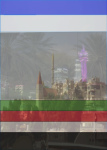 Armstrong, Karen. Islam: A Short History. 2000. Rev. and Updated. Modern Library 2002.
Armstrong, Karen. Islam: A Short History. 2000. Rev. and Updated. Modern Library 2002.
Dershowitz, Alan. The Case for Israel. Wiley. 2003. E-book.
I read these two books in partial preparation for the trip I took earlier in the fall and found them both absorbing but also disappointing. While their subject matter is in some ways connected, their foci are very different. Further, both Dershowitz and Armstrong attract strong responses both supportive and antagonistic to their points of view. However, in this short review, I am not going to espouse any particular attitude. I will simply outline what the books attempt to do, outline their organizational strategies, and explain why I ultimately found both works slightly disappointing.
 A quick review of Dershowitz’s various Google entries and so on reveals that you don’t need me to let you know that Dershowitz might well be described as Lead Defence Counsel for Israel. As its title suggests, this book presents a case arguing on behalf of the state of Israel. Each chapter is divided into four sections and responds to evidence presented against Israel. First, he outlines “The Accusation; then he identifies “The Accusers” and examines their supporting evidence. “The Reality” asserts the alternate view, supporting evidence for which is outlined in “The Proof.” In his Introduction, Dershowitz asserts his reliance on “objective” and often “overtly anti-Israel sources.” While he doesn’t include a Bibliography, his notes section is extensive and informative, so if the reader so desires he or she is well able to track down Dershowitz’s sources and decide for him or herself to what extent Dershowitz is convincing.
A quick review of Dershowitz’s various Google entries and so on reveals that you don’t need me to let you know that Dershowitz might well be described as Lead Defence Counsel for Israel. As its title suggests, this book presents a case arguing on behalf of the state of Israel. Each chapter is divided into four sections and responds to evidence presented against Israel. First, he outlines “The Accusation; then he identifies “The Accusers” and examines their supporting evidence. “The Reality” asserts the alternate view, supporting evidence for which is outlined in “The Proof.” In his Introduction, Dershowitz asserts his reliance on “objective” and often “overtly anti-Israel sources.” While he doesn’t include a Bibliography, his notes section is extensive and informative, so if the reader so desires he or she is well able to track down Dershowitz’s sources and decide for him or herself to what extent Dershowitz is convincing.
 While Dershowitz presents argument, Armstrong’s discourse is primarily explanation, and as the subtitle of her book suggests, Islam delivers a short history of Islam from its beginnings in the early seventh century of the common era to the turn of the twentieth century. Her Bibliography is quite extensive, though her chapter notes are brief. The book includes an introductory chronology of the development of Islam and a concluding section listing short biographies of the major figures in the development of the faith as well as a glossary of Arabic terms together with a pronunciation guide. There are also twelve study/discussion questions at the very end of the book.
While Dershowitz presents argument, Armstrong’s discourse is primarily explanation, and as the subtitle of her book suggests, Islam delivers a short history of Islam from its beginnings in the early seventh century of the common era to the turn of the twentieth century. Her Bibliography is quite extensive, though her chapter notes are brief. The book includes an introductory chronology of the development of Islam and a concluding section listing short biographies of the major figures in the development of the faith as well as a glossary of Arabic terms together with a pronunciation guide. There are also twelve study/discussion questions at the very end of the book.
 For the most part, Armstrong’s tone is moderate. Her aim is to explain what the tenets and practices of Islam are and how they have been shaped by the Muslim experience and understanding of history. Certainly, it is this view of history that Armstrong is at pains to make clear to her readers. In her Preface, she explains how “Muslims have looked for God in history.” A Muslim’s “chief duty was to create a just community in which all members, even the most weak and vulnerable, were treated with absolute respect.” She goes on to explain how “A Muslim had to redeem history, and that meant that state affairs were not a distraction from spirituality but the stuff of religion itself” (xi). The rest of the book is devoted to illustrating how Islam’s “sacralization of history” (xii) has influenced the development of Islam and affected how Muslims have responded to their past and to their presents.
For the most part, Armstrong’s tone is moderate. Her aim is to explain what the tenets and practices of Islam are and how they have been shaped by the Muslim experience and understanding of history. Certainly, it is this view of history that Armstrong is at pains to make clear to her readers. In her Preface, she explains how “Muslims have looked for God in history.” A Muslim’s “chief duty was to create a just community in which all members, even the most weak and vulnerable, were treated with absolute respect.” She goes on to explain how “A Muslim had to redeem history, and that meant that state affairs were not a distraction from spirituality but the stuff of religion itself” (xi). The rest of the book is devoted to illustrating how Islam’s “sacralization of history” (xii) has influenced the development of Islam and affected how Muslims have responded to their past and to their presents.
 Her later chapters may well be of most interest to us today dealing as they do with the relationship between the West and the Islamic world and in the differing experiences of modernity. If there is any persuasive note in Armstrong’s text, it is in her plea for the West to “cultivate a more accurate appreciation of Islam in the third Christian millennium” (187). In her epilogue, written after the events of 11 September 2001, she asserts, “It has never been more important for Western people to acquire a just appreciation and understanding of Islam” (191).
Her later chapters may well be of most interest to us today dealing as they do with the relationship between the West and the Islamic world and in the differing experiences of modernity. If there is any persuasive note in Armstrong’s text, it is in her plea for the West to “cultivate a more accurate appreciation of Islam in the third Christian millennium” (187). In her epilogue, written after the events of 11 September 2001, she asserts, “It has never been more important for Western people to acquire a just appreciation and understanding of Islam” (191).
 Since Armstrong wrote those words, fifteen years have passed. Dershowitz’s book was published in 2003. Both works felt more than a little dated to me. I wanted some engagement from both writers with the current situation and was disappointed to find that some kind of Afterwords/Epilogues other than Armstrong’s brief note, had not been appended to later printings of the works. However, that said, I would still recommend both works as introductions to subjects complex and challenging on many levels.
Since Armstrong wrote those words, fifteen years have passed. Dershowitz’s book was published in 2003. Both works felt more than a little dated to me. I wanted some engagement from both writers with the current situation and was disappointed to find that some kind of Afterwords/Epilogues other than Armstrong’s brief note, had not been appended to later printings of the works. However, that said, I would still recommend both works as introductions to subjects complex and challenging on many levels.





